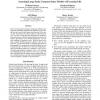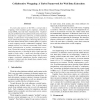50 search results - page 5 / 10 » Scaling Textual Inference to the Web |
AAAI
2007
13 years 9 months ago
2007
Recent work has shown promise in using large, publicly available, hand-contributed commonsense databases as joint models that can be used to infer human state from day-to-day sens...
KDD
2009
ACM
14 years 8 months ago
2009
ACM
Tracking new topics, ideas, and "memes" across the Web has been an issue of considerable interest. Recent work has developed methods for tracking topic shifts over long ...
ICDE
2007
IEEE
14 years 8 months ago
2007
IEEE
To access data sources on the Web, a crucial step is wrapping, which translates query responses, rendered in textual HTML, back into their relational form. Traditionally, this pro...
DSML
2008
13 years 8 months ago
2008
: Today's online model repositories offer to download and view the textual specifications of e.g. metamodels and models in the browser. For users, in order to efficiently sear...
JODS
2006
13 years 7 months ago
2006
Defining and using ontology to annotate web resources with semantic markups is generally perceived as the primary way to implement the vision of the Semantic Web. The ontology prov...


